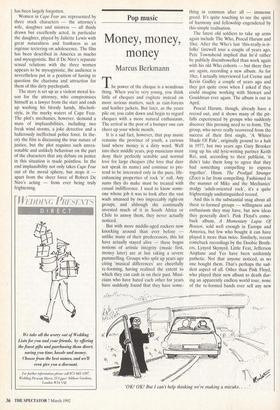Pop music
Money, money, money
Marcus Berkmann
The power of the cheque is a wondrous thing. When you're very young, you think little of cheques and cogitate instead on more serious matters, such as rain-forests and leather jackets. But later, as the years pile on, you calm down and begin to regard cheques with a more natural enthusiasm., The arrival in the post of a bumper one can cheer up your whole month.
It is a sad fact, however, that pop music remains the province of youth, a curious land where money is a dirty word. Well into their middle years, pop musicians must deny their perfectly sensible and normal love for large cheques (the love that dare not speak its name) and continue to pre- tend to be interested only in the pure, life- enhancing properties of rock 'n' roll. Any sums they do make must be treated with casual indifference. I used to know some- one whose job it was to look after the vast wads amassed by two impeccably right-on groups, and although she continually invested much of it in South Africa or Chile to annoy them, they never actually noticed.
But with more middle-aged rockers now knocking around than ever before — unlike many of their predecessors, this lot have actually stayed alive — these bogus notions of artistic integrity (music first, money later) are at last taking a severe pummelling. Groups who split up years ago citing 'musical differences' are cheerfully re-forming, having realised the extent to which they can cash in on their past. Musi- cians who have hated each other for years have suddenly found that they have some-
thing in common after all — immense greed. It's quite touching to see the spirit of harmony and fellowship engendered by this simple realisation.
The latest old soldiers to take up arms again include The Who, Procul Harum and lOcc. After the Who's last 'this-really-is-it- folks' farewell tour a couple of years ago, Pete Townshend implied that he'd rather be publicly disembowelled than work again with his old Who cohorts — but there they are again, recording a new album. As for lOcc, I actually interviewed Lol Creme and Kevin Godley a couple of years ago and they got quite cross when I asked if they could imagine working with Stewart and Gouldman ever again. The album is out in April.
Procul Harum, though, already have a record out, and it shows many of the pit- falls experienced by groups who suddenly discover this pressing need to re-form. The group, who never really recovered from the success of their first single, 'A Whiter Shade Of Pale', originally ground to a halt in 1977, but two years ago Gary Brooker rang up his old lyric-writing partner Keith Rei, and, according to their publicist, 'it didn't take them long to agree that they had something compelling to express together'. Hmm. The Prodigal Stranger (Zoo) is far from compelling. Fashioned in the manner of Mike and the Mechanics' stodgy 'adult-oriented rock', it's a quite frighteningly undistinguished record.
And this is the substantial snag about all these re-formed groups — willingness and enthusiasm they may have, but new ideas they generally don't. Pink Floyd's come- back album, A Momentary Lapse Of Reason, sold well enough in Europe and America, but few who bought it can have played it more than twice. Similarly, recent comeback recordings by the Doobie Broth- ers, Lynyrd Skynyrd, Little Feat, Jefferson Airplane and Yes have been uniformly pathetic. Not that anyone noticed, as no one bought them. That's perhaps the sad- dest aspect of all. Other than Pink Floyd, who played their new album to death dur- ing an apparently endless world tour, none of the re-formed bands ever sell any new 'OK! OK! But I can't help thinking we're making a mistake. . .
records. People aren't interested in their new stuff; they just want to see them live, playing their old stuff. The new records are simply a way of reminding people that the group is back together again — they're not actually meant to be listened to.
Still, the money generated by profitable American tours is, I'm sure, a consolation — and as nostalgia slowly catches up with all of our pasts, even punk bands, the ulti- mate proponents of 'artistic expression', are getting back together and paying some bills. Stiff Little Fingers have reformed, as have Buzzcocks, and The Clash have apparently been offered many millions to do so. Ah, the power of cheques. Where would music be without it?



















































 Previous page
Previous page